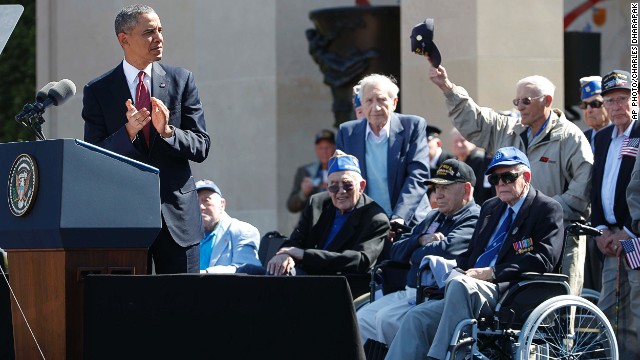
World leaders gather for D-Day ceremony
CNN|Added on June 6, 2014 Francois Hollande welcomed veterans and world leaders to a ceremony to mark the 70th anniversary of the D-Day invasion.
Obama: D-Day veterans’ stories should remain ‘seared into memory’

Obama: They sacrificed so we can be free
(CNN) — President Barack Obama paid tribute Friday to the U.S. service members who “defied every danger” to pour onto the beaches of Normandy 70 years ago in defense of liberty.
His remarks at the American Cemetery in Colleville-sur-Mer, which overlooks Omaha Beach where so many fell, were part of a series of solemn events to commemorate the D-Day landings in northern France.
Chief among them is an elaborate international ceremony on the stretch code-named Sword Beach, in Ouistreham, for which world leaders and veterans took places in stands set up on the sand.
As the ceremony got under way under brilliant sunshine, military bands marched on a map of the globe laid out across the golden strand in front of French President Francois Hollande.
Hollande spoke of the bravery of the young men who waded ashore under a deluge of German fire seven decades earlier, through waters turned red with blood, hailing them all as heroes.
Transcript of Obama’s speech on 70th Anniversary of D-Day By the CNN Staff June 6, 2014 — Updated 1215 GMT (2015 HKT)
(CNN) — Below are the President’s remarks as prepared for Friday’s event at the Normandy American Cemetery and Memorial at Omaha Beach.
Remarks of President Barack Obama — As Prepared for Delivery 70th Anniversary of D-Day
Omaha Beach, Normandy, France
June 6, 2014
If prayer were made of sound, the skies over England that night would have deafened the world.
Captains paced their decks. Pilots tapped their gauges. Commanders pored over maps, fully aware that for all the months of meticulous planning, everything could go wrong: the winds, the tides, the element of surprise — and above all, the audacious bet that what waited on the other side of the Channel would compel men not to shrink away, but to charge ahead.
Fresh-faced GIs rubbed trinkets, kissed pictures of sweethearts, checked and re-checked their equipment. “God,” asked one, “Give me guts.” And in the pre-dawn hours, planes rumbled down runways; gliders and paratroopers slipped through the sky; giant screws began to turn on an armada that looked like more ships than sea. And more than 150,000 souls set off towards this tiny sliver of sand upon which hung more than the fate of a war, but the course of human history.
President Hollande, distinguished guests, I am honored to return here today to pay tribute to the men and women of a generation who defied every danger: among them, our veterans of D-Day. Gentlemen, we are truly humbled by your presence today.
Just last week, I received a letter from a French citizen. “Dear Mr. President and the American people,” he wrote, “[we are] honored to welcome you…to thank you again for all the pain and efforts of [the] American people and others in our common struggle for freedom.”
Today, we say the same to the people of France. Thank you, especially, for the generosity you’ve shown the Americans who’ve come here over the generations — to these beaches, and to this sacred place of rest for 9,387 Americans. At the end of the war, when our ships set off for America filled with our fallen, tens of thousands of liberated Europeans turned out to say farewell. And they pledged to take care of the more than 60,000 Americans who would remain in cemeteries on this continent “as if,” in the words of one man, “their tombs were our children’s.” You have kept your word, like the true friends you are. We are forever grateful.
Here, we don’t just commemorate victory, as proud of that victory as we are; we don’t just honor sacrifice, as grateful as the world is; we come to remember why America and our allies gave so much for the survival of liberty at its moment of maximum peril. And we come to tell the story of the men and women who did it, so that it remains seared into the memory of the future world.
We tell this story for the old soldiers who pull themselves a little straighter today to salute brothers who never made it home. For the daughter who clutches a faded photo of her father, forever young. For the child who runs his fingers over colorful ribbons he knows signify something of great consequence — even if he doesn’t yet know why. We tell this story to bear what witness we can to what happened when the boys from America reached Omaha Beach.
By daybreak, blood soaked the water, and bombs broke the sky. Thousands of paratroopers had dropped into the wrong landing sites; thousands of rounds bit into flesh and sand. Entire companies’ worth of men fell in minutes. “Hell’s Beach” had earned its name.
By 8:30 a.m., General Omar Bradley expected our troops to be a mile inland. “Six hours after the landings,” he wrote, “we held only ten yards of beach.” In our age of instant commentary, the invasion would have been swiftly and roundly declared, as it was by one officer, “a debacle.”
But a race to judgment does not take into account the courage of free men. “Success may not come with rushing speed,” President Roosevelt would say that night, “But we shall return again and again.” Paratroopers fought through the countryside to find one another. Rangers pulled themselves over those cliffs to silence Nazi guns. To the West, Americans took Utah Beach with relative ease. To the East, the British tore through the coast, fueled by the fury of five years of bombs over London, and a solemn vow to “fight them on the beaches.” The Canadians, whose shores had not been touched by war, drove far into France. And here, at Omaha, troops who finally made it to the seawall used it as shelter — where a general barked, “If you’re Rangers…lead the way!”
By the end of that longest day, this beach had been fought, lost, refought and won — a piece of Europe once again liberated and free. Hitler’s Wall was breached, letting loose Patton’s Army to pour into France. Within a week, the world’s bloodiest beach had become the world’s busiest port. Within a month, one million Allied troops thundered through Normandy into Europe, and as our armies marched across the continent, one pilot said it looked “as if the very crust of the Earth had shaken loose.” The Arc de Triomphe lit up for the first time in years, and Paris was punctuated by shouts of “Vive la France” and “Vive les États Unis!”
Of course, even as we gather here at Normandy, we remember that freedom’s victory was also made possible by so many others who wore America’s uniform. Two years before he commanded armies here, Eisenhower’s troops sliced through Northern Africa. Three times before D-Day, our GIs stormed the beaches at Sicily, Salerno, and Anzio. Divisions like the Fighting 36th brawled their way through Italy, fighting through the mud for months, marching through towns past waving children before opening the gates to Rome. As the “dogfaces” marched to victory in Europe, the Devil Dogs — the Marines — clawed their way from island to island in the Pacific, in some of the war’s fiercest fighting. And back home, an army of women, including my grandmother, rolled up their sleeves to help build a mighty arsenal of democracy.
But it was here, on these shores, that the tide was turned in that common struggle for freedom.
What more powerful manifestation of America’s commitment to human freedom than the sight of wave after wave of young men boarding those boats to liberate people they’d never met?
We say it now as if it couldn’t be any other way. But in the annals of history, the world had never seen anything like it. When the war was won, we claimed no spoils of victory — we helped Europe rebuild. We claimed no land other than the earth where we bury those who gave their lives under our flag, and where we station those who still serve under it. But America’s claim — our commitment — to liberty; to equality; to freedom; to the inherent dignity of every human being — that claim is written in blood on these beaches, and it will endure for eternity.
Omaha — Normandy — this was democracy’s beachhead. And our victory in that war decided not just a century, but shaped the security and well-being of all posterity. We worked to turn old adversaries into new allies. We built new prosperity. We stood once more with the people of this continent through a long twilight struggle until finally, a wall tumbled down, and an Iron Curtain, too. From Western Europe to East; from South America to Southeast Asia; seventy years of democratic movements spread. Nations that once knew only the blinders of fear began to taste the blessings of freedom.
That would not have happened without the men who were willing to lay down their lives for people they’d never met, and ideals they couldn’t live without.
That would not have happened without the troops President Roosevelt called “the life-blood of America…the hope of the world.”
They left home barely more than boys and returned home heroes. But to their great credit, that is not how this generation carried itself. After the war, some put away their medals, kept humble about their service, and moved on. Some, carrying shrapnel and scars, found that they couldn’t. Many, like my grandfather, who served in Patton’s Army, lived a quiet life, trading one uniform and set of responsibilities for another — teacher, doctor, engineer, Dad. Our country made sure millions of them earned a college education, opening opportunity on an unprecedented scale. They married those sweethearts and bought new homes and raised families and built businesses, lifting up the greatest middle class the world has ever known. And through it all, they were inspired, I suspect, by memories of fallen brothers — memories that drove them to live their lives each day as best they possibly could.
Whenever the world makes you cynical — stop and think of these men.
Think of Wilson Colwell, who was told he couldn’t pilot a plane without a high school degree — so he decided to jump out of them instead. And he did, here on D-Day, with the 101st Airborne — when he was just sixteen years old.
Think of Harry Kulkowitz, the Jewish son of Russian immigrants, who fudged his age at enlistment so he could join his friends in the fight. Don’t worry, Harry, the statute of limitations has expired. Harry came ashore at Utah Beach on D-Day. And now that he’s come back, we said he could have anything he wants for lunch today — he helped liberate this coast, after all. But this humble hero said a hamburger would do fine. And what’s more American than that?
Think of “Rock” Merritt, who saw a recruitment poster asking him if he was man enough to be a paratrooper — so he signed up on the spot. That decision landed him here on D-Day with the 508th regiment — a unit that would suffer heavy casualties. Seventy years later, it’s said that all across Fort Bragg, they know Rock. But not just for his exploits on D-Day, or his 35 years in the Army — but because 91 year-old Rock Merritt still spends his time speaking to the young men and women of today’s Army, and still bleeds “O.D. Green” for his 82nd Airborne.
Whenever the world makes you cynical — stop and think of these men.
Wilson, Harry, and Rock are here today, and I would ask them — along with our veterans of D-Day — if you can, please stand; if not, please raise your hand and let us recognize your service.
These men waged war so that we might know peace. They sacrificed so that we might be free. They fought in hopes of a day when we’d no longer need to.
Gentlemen, I want each of you to know that your legacy is in good hands. For in a time when it has never been more tempting to pursue narrow self-interest and slough off common endeavor, this generation of Americans — our men and women of war — have chosen to do their part as well.
Rock, I want you to know that Staff Sergeant Melvin Cedillo-Martin, who’s here today, is following in your footsteps. He just had to become an American first. Melvin was born in Honduras, moved to the States, and joined the Army. After tours in Iraq and Afghanistan, he was reassigned to the 82nd Airborne, and Sunday, he’ll parachute into Normandy. “I became part of a family of real American heroes,” he says. “The Paratroopers of the 82nd Airborne.”
Wilson, you should know that Specialist Jannise Rodriguez joined the Army not even two years ago, was assigned to the 101st Airborne, and just last month, earned the title of the 101st Airborne Division Air Assault Soldier of the Year. That’s inspiring, but not surprising — not when the women of today’s military have taken on responsibilities, including combat, like never before.
I want each of you to know that their commitment to their fellow service members and veterans endures. Sergeant First Class Brian Hawthorne’s grandfather served under General Patton and General MacArthur. Brian himself served two tours in Iraq, earning the Bronze Star in Baghdad for saving the life of his best friend, and today, he and his wife use their experience to help other veterans and military families navigate theirs. Brian’s here in Normandy to participate in Sunday’s jump — and here, just yesterday, he reenlisted in the Army Reserve.
This generation — this 9/11 Generation of service members — they, too, felt some tug; they answered some call; they said “I’ll go.” They too chose to serve a cause that’s greater than self; many even after they knew they’d be sent into harm’s way. And for more than a decade, they have endured tour after tour.
Sergeant First Class Cory Remsburg has served ten. I’ve told Cory’s incredible story before, most recently when he sat with my wife, Michelle, at the State of the Union Address. But it was here, at Omaha Beach, on the 65th anniversary of D-Day, where I first met Cory and his fellow Army Rangers, right after they made their own jump into Normandy. The next time I saw him, he was in the hospital, unable to speak or walk after an IED nearly killed him in Afghanistan. But over the past five years, Cory has grown stronger, learning to speak again and stand again and walk again — and earlier this year, he jumped out of a plane again.
The first words Cory said to me after his accident echoed those words first shouted all those years ago on this beach: “Rangers lead the way.”
Cory Remsburg has come back today, along with Melvin, Jannise, Brian, and many of their fellow active duty service members. I ask them to stand or raise their hands, too. Thank you.
We are on this Earth for only a moment in time. And fewer of us have parents and grandparents to tell us about what the veterans of D-Day did here seventy years ago. So we have to tell their stories for them. We have to do our best to uphold in our own lives the values that they were prepared to die for. We have to honor those who carry forward that legacy today, recognizing that people cannot live in freedom unless free people are prepared to die for it.
And as today’s wars come to an end, this generation of servicemen and women will step out of uniform. They, too, will build families and lives of their own. They, too, will become leaders in their communities, in politics, in commerce and industry — the leaders we need for the beachheads of our time. God willing, they, too, will grow old in the land they helped keep free. And someday, future generations, whether seventy or seven hundred years hence, will gather at places like this to honor them — and to say that these were generations of men and women who proved once again that the United States of America is and will remain the greatest force for freedom the world has ever known.
May God bless our veterans and all who served with them, including those who rest here in eternal peace. And may God bless all who serve today for the peace and security of our world.
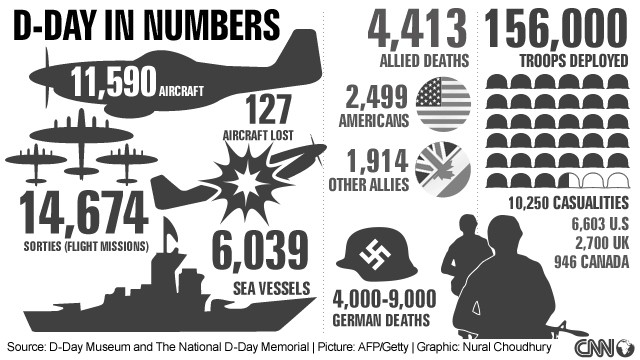 D-Day by the numbers
D-Day by the numbers

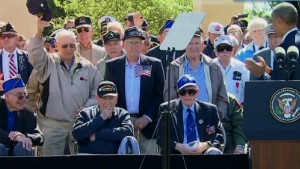
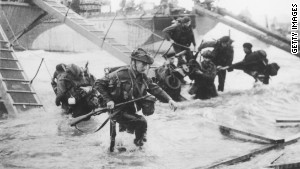
“I want to express my gratitude to all the fighters who are no longer here,” Hollande said, going on to list the American, British, Canadian, Polish, Belgian and other forces that took part. He paid tribute to the many Russians who died during World War II and to the German victims of the Nazi regime.
Secret D-Day training mission cost hundreds of lives
The Allied forces’ sacrifice allowed Europe to live in security today, Hollande said in a speech that also highlighted the challenges the world now faces.
It was followed by a dance performance depicting the occupation, liberation and post-war reconstruction of Europe.
The D-Day landings, in which mainly British, U.S. and Canadian troops invaded Nazi-occupied France, were a turning point in World War II.
D-Day: Exploring the myths of the Normandy landings
Obama: ‘Democracy’s beachhead’
Obama, speaking earlier at the American Cemetery, said he was honored to be there “to pay tribute to the men and women of a generation who defied every danger: among them, our veterans of D-Day.”
Lengthy applause rang out as the U.S. President said he was humbled by the presence of some of those veterans at the ceremony.
Share your family’s D-Day stories
“Here, we don’t just commemorate victory, as proud of that victory as we are; we don’t just honor sacrifice, as grateful as the world is; we come to remember why America and our allies gave so much for the survival of liberty at this moment of maximum peril,” Obama said.
Their story should remain “seared into the memory of a future world,” he said, describing Normandy as “democracy’s beachhead.”
He said, “It was here, on these shores, that the tide was turned in that common struggle for freedom.
“What more powerful manifestation of America’s commitment to human freedom than the sight of wave after wave of young men boarding those boats to liberate people they’d never met?”
After the poignant ceremony, Obama and Hollande moved among the veterans and military officials, shaking hands and thanking them for their service.
The cemetery, which sits on a cliff overlooking Omaha Beach and the English Channel, contains the graves of 9,387 U.S. servicemen, most of whom lost their lives in the D-Day landings.
Omaha was the deadliest of the landing sites because German forces were able to fire from fortified positions on the cliffs above as the first waves of soldiers reached the shore.
70 years later, D-Day vet jumps again
Putin and Obama meet
A lunch for world leaders and veterans hosted by Hollande before the Sword Beach ceremony was the scene of an impromptu meeting between Obama and Russian President Vladimir Putin.
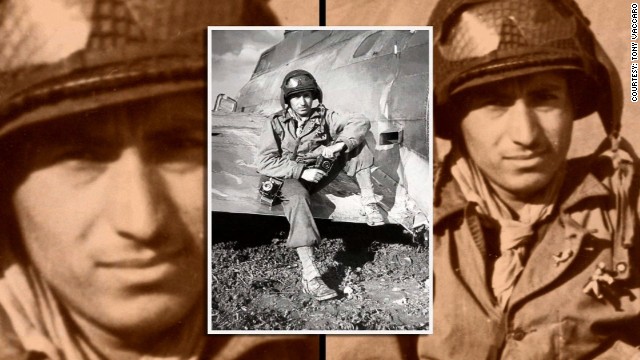 G.I. Tony Vaccaro carried a camera as well as a gun when he landed in Normandy in June 1944, as part of the Allied Invasion Force.
G.I. Tony Vaccaro carried a camera as well as a gun when he landed in Normandy in June 1944, as part of the Allied Invasion Force.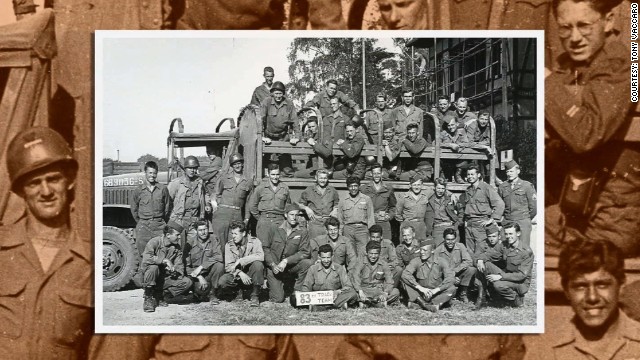 Vaccaro was a member of the 83rd Infantry Division. His commanding officer gave him permission to take photographs of the unit’s experiences during the war.
Vaccaro was a member of the 83rd Infantry Division. His commanding officer gave him permission to take photographs of the unit’s experiences during the war.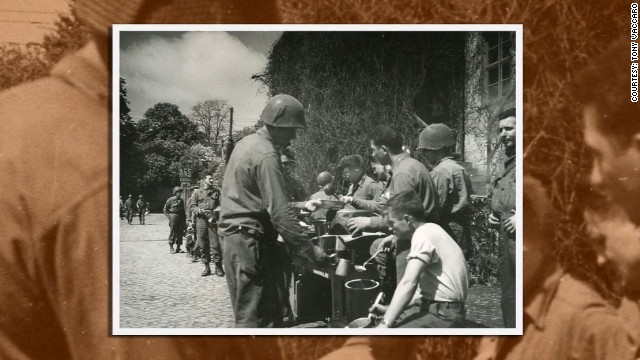 His close relationship with many of the people he photographed means his pictures are particularly intimate and candid.
His close relationship with many of the people he photographed means his pictures are particularly intimate and candid.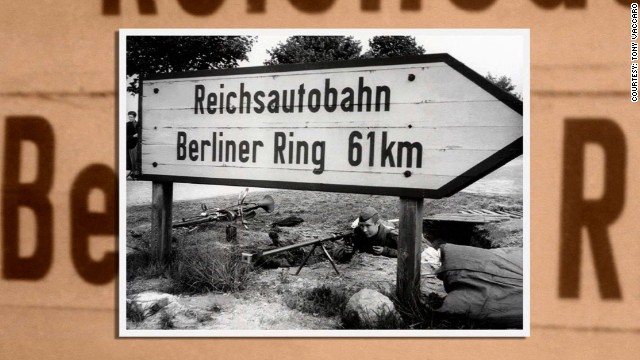 He took more than 8,000 photographs, following the progress of his unit from the beaches of Normandy to Berlin.
He took more than 8,000 photographs, following the progress of his unit from the beaches of Normandy to Berlin.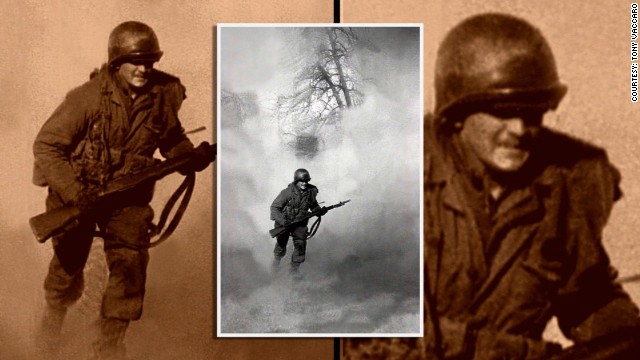 The images show the fighting …
The images show the fighting …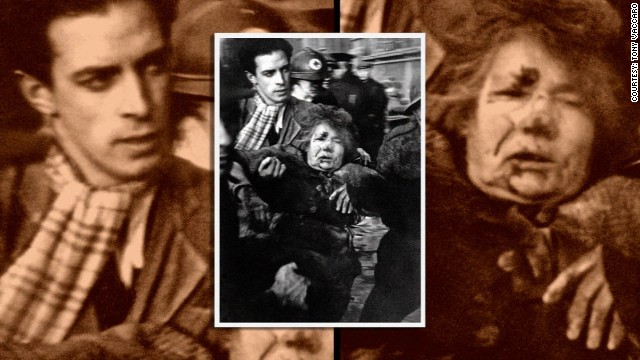 … and the devastation it left behind.
… and the devastation it left behind.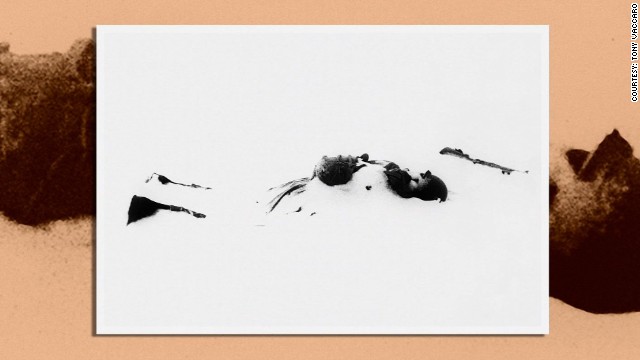 An exhibition of Vaccaro’s photos, “Shots of War,” is on display at the Caen Memorial, a stone’s throw from Omaha Beach, as part of the 70th anniversary of D-Day.
An exhibition of Vaccaro’s photos, “Shots of War,” is on display at the Caen Memorial, a stone’s throw from Omaha Beach, as part of the 70th anniversary of D-Day.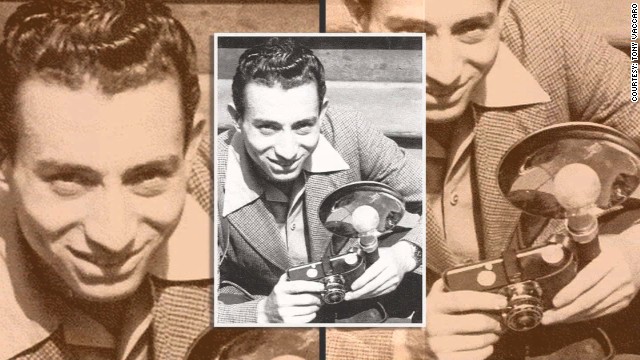 After the war, Vaccaro became a professional portrait photographer, taking pictures of stars including Charlie Chaplin, Marlene Dietrich and Pablo Picasso. Tony Vaccaro: The soldier armed with a camera
After the war, Vaccaro became a professional portrait photographer, taking pictures of stars including Charlie Chaplin, Marlene Dietrich and Pablo Picasso. Tony Vaccaro: The soldier armed with a camera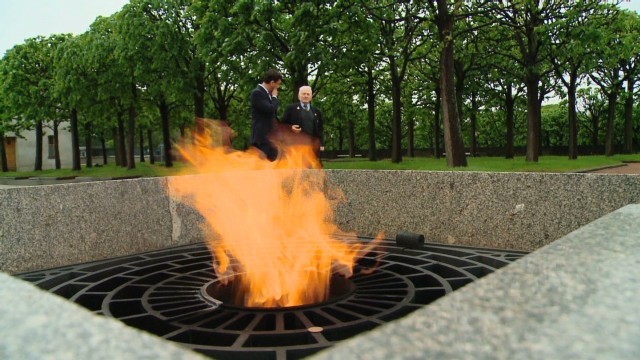
The pair spoke on the margins of the lunch in what Deputy National Security Adviser Ben Rhodes said was an informal conversation, not a formal bilateral meeting. It lasted 10 to 15 minutes, he said.
Obama and Putin have been at loggerheads in recent weeks over Russian actions in Ukraine, and the pair were not seated next to each other for lunch.
The run-up to the commemorations has been dominated by the crisis in Ukraine, which has sparked the worst East-West tensions since the end of the Cold War.
Putin and Ukrainian President-elect Petro Poroshenko also talked briefly before the leaders went in to lunch in Benouville, with German Chancellor Angela Merkel standing between the two as they spoke.
G7 leaders have urged Putin to engage with Poroshenko, who will be inaugurated Saturday, as Ukraine’s legitimate leader and take steps to ease the pro-Russia separatist unrest roiling eastern Ukraine.
Putin was excluded from a meeting of G7 leaders held this week in Brussels, Belgium, as part of measures to sanction Moscow over its annexation in March of Ukraine’s Crimea region.
‘Touching’ commemoration
More than 156,000 troops crossed the English Channel during the D-Day invasion on June 6, 1944. Nearly 10,000 Allied troops were killed or wounded.
Nicholas Soames, grandson of British wartime leader Winston Churchill, said it was “very touching” that so many people had come to take part in what will probably be the last commemoration of the D-Day landings on this scale, since those who survived are now in their 80s and 90s.
Nearly 1,000 veterans have traveled to France to take part in the events, according to the French government.
Veteran Bernard Jordan, 89, went missing from his nursing home in Hove, a town on the south coast of England, on Thursday, wearing his war medals underneath his jacket, according to CNN affiliate ITV.
He was bound for the French shores once more.
But the nursing home didn’t know and called police, the station said.
Jordan was found in France a day later marking the 70th anniversary with his friends. Another veteran called the care home to say he met Jordan on a coach to France and both men were well in a Ouistreham hotel, according to ITV News.
The affiliate caught up with Jordan on his return leg, about to board a ferry home.
He called the commemorations “a first-class show.” He attended them last year.
“That was the main reason I came over here,” he told the affiliate. “Touch wood … if I’m still about, I should try it the next few years as well.”
When the affiliate asked whether he would be in trouble back home, he laughed: “I might be, but I hope not.” He was then escorted away.
Britain’s Queen Elizabeth II is the only living head of state who served in World War II, working as a mechanic and military truck driver in the Women’s Auxiliary Territorial Service.
‘Strength of heart’
Earlier, Hollande spoke at a war memorial in the city of Caen at a ceremony to honor civilian victims and paid tribute to all those killed in the conflict.
He recalled the “strength of heart and bravery” of those who helped to liberate France from Nazi Germany, as well as the many victims in Normandy — more of them civilians than soldiers.
Although the war may be long over in Normandy, Hollande said, “the war is still here in this tumultuous, uncertain and sometimes threatening world — and in all wars, it is civilians who pay a heavy price.”
The Queen, Prince Philip and Prince Charles took part in a ceremony at the British War Cemetery in Bayeux, the largest of the Commonwealth cemeteries in France.
Further along the French coast in Arromanches, the Duke and Duchess of Cambridge, William and Kate, attended a tea party for veterans, and each royal spoke separately with the silver-haired and beret-attired honorees.
Canadian Prime Minister Stephen Harper was also in Normandy to honor the Canadian forces that stormed Juno Beach 70 years ago.
“It is a source of enormous national pride that Canadians played such a pivotal role in ensuring the success of the D-Day landings,” he said in a statement.
“We are also deeply humbled by the enormous sacrifices made by our fellow citizens, who with grim determination, stood shoulder to shoulder with like-minded allies to fight evil.”
A fireworks display was staged Thursday night along the Normandy coastline where the landings took place.
Obama vows to stand with Ukraine as he meets President-elect
Opinion: Putin’s empire-building is not a new Cold War
CNN’s Jeff Kepnes, Max Foster and Christiane Amanpour contributed to this report.
http://edition.cnn.com/2014/06/06/world/europe/d-day-commemoration/
President Obama Commemorates the 70th Anniversary of D-Day
President Barack Obama attends the 70th French-American Commemoration D-Day Ceremony at the Normandy American Cemetery and Memorial in Colleville-sur-Mer, France, June 6, 2014.
http://edition.cnn.com/2014/06/06/world/europe/obama-putin-france-d-day/index.html?hpt=hp_mid
http://edition.cnn.com/2014/06/06/world/europe/obama-putin-france-d-day/index.html?hpt=hp_mid
http://edition.cnn.com/2014/06/05/opinion/opinion-d-day-myth-reality/index.html?hpt=hp_c2
http://edition.cnn.com/2014/06/05/world/europe/d-day-paratrooper-jumps-again/index.html?hpt=hp_mid
Obama to send bundler Jane Hartley to Paris

As President Obama attended the 70th anniversary D-Day events in France on Friday, the White House announced he plans to nominate Jane Hartley as the U.S. top envoy in Paris.
The Hartley pick has been rumored for a while. She is a top Democratic fundraiser, raising at least $500,000 for Obama in 2012. She’s the chief executive of the Observatory Group, an economic and political advisory firm in Manhattan. Hartley and her husband Ralph Schlosstein, an investment banker, are a power couple in the finance world, who have held top dollar fundraisers for the president.
The France post has been vacant since Charles Rivkin left in November 2013. He is now serving in the Obama administration as assistant secretary of state for economic and business affairs.
